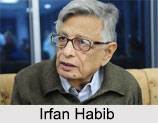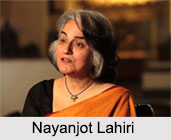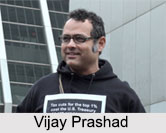 Indian Historians have contributed hugely in the domain of Indian history and its documentation. The Indian historians kept on analysing and researching on the historical facts of the nation since 16th century. They established many theories through their extensive thesis works. They often took part in various social programs and welfare organisations.
Indian Historians have contributed hugely in the domain of Indian history and its documentation. The Indian historians kept on analysing and researching on the historical facts of the nation since 16th century. They established many theories through their extensive thesis works. They often took part in various social programs and welfare organisations.
Famous Indian Historians
Following are the Famous Indian Historians of all time:
Romila Thapar: Romila Thapar is an Indian historian whose primary area of study is ancient India. She is the author of quite a few books including the popular volume, "A History of India", "The Past and Prejudice", "Cultural Pasts: Essays in Early Indian History" etc. She is at present a Professor at Jawaharlal Nehru University (JNU) in New Delhi. She has twice been offered the Padma Bhushan award, but has declined both the times.
Abd al-Qadir Bada`uni: Mullah Abd-al-Qadir Bada`uni was an Indo-Persian historian and translator living in the Mughal kingdom. The most famous work of Bada`uni is "Muntakhab-ut-Tawarikh" (Selection of Chronicles) or "Tarikh-i-Bada`uni" (Bada`uni`s History). He also translated the Hindu works, the Ramayana and the Mahabharata (Razmnama).
 Bengaluru Gundappa Lakshminarayana Swamy: He was an Indian botanist and Kannada writer who served as a professor and head of the department of Botany and as Principal of Presidency College, Chennai. His works include "Hasiru Honnu" (Green Gold), "Tamilu Talegala Naduve", "Americadalli naanu", "Diary of a Botanist" etc.
Bengaluru Gundappa Lakshminarayana Swamy: He was an Indian botanist and Kannada writer who served as a professor and head of the department of Botany and as Principal of Presidency College, Chennai. His works include "Hasiru Honnu" (Green Gold), "Tamilu Talegala Naduve", "Americadalli naanu", "Diary of a Botanist" etc.
Bhaskar Anand Saletore: He was a well-known Indian historian from Mangalore, Karnataka. He wrote a famous book "Social and Political Life in the Vijayanagara Empire". His other works are "Ancient Karnataka--History of Tuluva, Poona", "Medieval Jainism with special reference to the Vijayanagara Empire", "India`s Diplomatic Relations with the East" etc.
Barun De: Barun De was an Indian historian. He served as founder-director of the Centre for Studies in Social Sciences, Kolkata and the Maulana Abul Kalam Azad Institute of Asian Studies, Kolkata. He had received the award of D.Litt. (Honouris Causa), North Bengal University. Some of his famous works are "Development and Political Culture: Bangladesh and India", "Mukti Sangrame Banglar Chatra-Samaj", "Proceedings of the Indian History Congress" etc.
Irfan Habib: Irfan Habib is an Indian historian of ancient and medieval India, following the approach of Marxist historiography. He is renowned for his strong position against Hindu and Islamic fundamentalism. He has authored several books, including "Agrarian System of Mughal India", "Essays in Indian History", "People`s History of India" etc. He has received the awards of Padma Bhushan and Yash Bharti. He was also among the first six Jawaharlal Nehru Fellowships program on 1968.
Muttayil Govindamenon Sankara Narayanan: M. G. S. Narayanan is an Indian historian, academic and political commentator. He headed the Department of History at Calicut University and afterwards served as the Member Secretary (1990-92) and as the Chairman of the Indian Council of Historical Research. Narayanan has published numerous research papers in Indian and international journals namely, "Cultural Symbiosis in Kerala", "The People`s Plan: a Debate on Kerala`s Decentralised Planning Experiment", "Calicut: The City of Truth Revisited" etc.
Satish Chandra: Satish Chandra was an Indian historian whose major area of specialisation was medieval Indian history. His famous works are "Essays in Medieval Indian Economic History", "Mughal Religious Policies, the Rajputs and the Deccan", "Parties and Politics at the Mughal Court" etc.
Sanjay Subrahmanyam: Sanjay Subrahmanyam is an Indian historian who specialises in the early modern period of India. He holds the Irving and Jean Stone Endowed Chair in Social Sciences at UCLA which he joined in 2004. In 2012, Subrahmanyam won the Infosys Prize for humanities for his "path-breaking contribution to history".
Bipan Chandra: He was an Indian historian, specialising in economic and political history of contemporary India. An emeritus professor of modern history at Jawaharlal Nehru University, he specialized on the Indian independence movement and is considered a principal scholar on Mahatma Gandhi. He authored several books, including "The Rise" and "Growth of Economic Nationalism".
Nayanjot Lahiri: Nayanjot Lahiri is a historian and archaeologist of ancient India and a professor of history at Ashoka University. Earlier she was the faculty of the department of history at the University of Delhi. She is the winner of the 2013 Infosys Prize, in the humanities, for her work in archaeology and the 2016 awardee of the John F. Richards prize for her book "Ashoka in Ancient India".
Vijay Prashad: Vijay Prashad is an Indian historian, journalist, commentator and a Marxist scholar. Prashad is the author of 20 books. In 2012, he published 5 books, including "Arab Spring", "Libyan Winter" (AK Press) and "Uncle Swami: South Asians in America Today" (The New Press). His book "The Darker Nations: A People`s History of the Third World" (2007) was chosen as the Best Non-fiction book by the Asian American Writers` Workshop in 2008 and it won the "Muzaffar Ahmed Book" Award in 2009.
Upinder Singh: Upinder Singh is a historian and the head of the History Department at the University of Delhi. She is also the recipient of the inaugural Infosys Prize in the category of Social Sciences. His works are "Ancient Delhi", "Mysteries of the Past: Archeological Sites in India", "Rethinking Early Medieval India: A Reader" etc.
Sarvepalli Gopal: Sarvepalli Gopal was a well-known Indian historian. He is the author of "Radhakrishnan: A Biography" and "Jawaharlal Nehru: A Biography".
 Tanika Sarkar: Tanika Sarkar is a historian of modern India based at the Jawaharlal Nehru University. Sarkar`s work focuses on the connections of religion, gender and politics in both colonial and postcolonial South Asia, in particular on women and the Hindu Right. Tanika Sarkar has published "Bengal 1928-1934: The Politics of Protest", "Women and the Hindu Right", "Hindu Wife, Hindu Nation: Community, Religion, Cultural Nationalism" etc. In 2004, she has received the "Rabindra Puraskar" from the Bangla Academy.
Tanika Sarkar: Tanika Sarkar is a historian of modern India based at the Jawaharlal Nehru University. Sarkar`s work focuses on the connections of religion, gender and politics in both colonial and postcolonial South Asia, in particular on women and the Hindu Right. Tanika Sarkar has published "Bengal 1928-1934: The Politics of Protest", "Women and the Hindu Right", "Hindu Wife, Hindu Nation: Community, Religion, Cultural Nationalism" etc. In 2004, she has received the "Rabindra Puraskar" from the Bangla Academy.
Ram Sharan Sharma: He was the founding Chairman of the Indian Council of Historical Research (ICHR) and a historian of international repute. He authored 115 books. His major works are "Aspects of Political Ideas and Institutions in Ancient India", "Indian Feudalism", "Perspectives in Social and Economic History of Ancient India" etc.
Dwijendra Narayan Jha: He is an Indian historian, specialising in ancient and medieval India. He was a professor of history at Delhi University and a member of the Indian Council of Historical Research.
With the time, Indian Historians are contributing hugely in the area of Indian history and its records. They regularly took part in different social programs and welfare organisations also.






